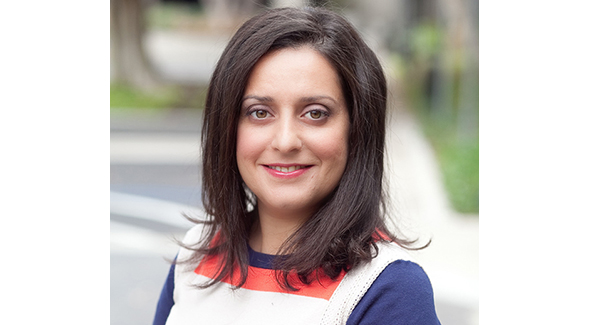SDSU's Health Disparities Expert Receives CSU Wang Family Excellence Award
Hala Madanat is recognized for her significant contributions benefiting underserved populations.

Through her work at San Diego State University, leading public health researcher Hala Madanat has impacted the health of thousands of San Diegans through programs to promote intuitive eating and physical activity in Latinx and other underserved communities, and contact tracing efforts in the communities hit hardest by the COVID-19 pandemic.
For these and other significant contributions, Madanat has been selected for the 2021 Wang Family Excellence Award for Outstanding Faculty Scholarship — the highest honor the California State University grants to faculty.
Each year, California State University selects one outstanding contributor in each of five categories — scholarship (or research), teaching, student success, service and staff performance — from across its 23 campuses for the prestigious awards.
“It’s humbling to be nominated by my colleagues on campus and to be chosen by the CSU for this honor,” said Madanat, SDSU’s interim vice president for research and innovation. “I’m grateful to the Wang family for the recognition they give CSU faculty and staff.”
CSU Chancellor Joseph I. Castro will present the awards, which provides $20,000 to each recipient, during a Jan. 26 CSU Board of Trustees virtual meeting. A committee composed of representatives from the board, the Academic Senate, CSU executive staff and a previous faculty Wang Award recipient selected the awardees.
“Dr. Madanat is a highly accomplished researcher in the field of health disparities. Her work has had a significant impact in helping underserved communities and in San Diego’s fight against COVID-19,” said SDSU President Adela de la Torre.
“Dr. Madanat’s research has earned the esteem of distinguished colleagues in the field, and she has been awarded several major grants to lead or co-lead investigations and interventions in cancer care, obesity, nutrition and most recently for COVID-19 contact tracing and testing,” de la Torre said. “We are proud of her accomplishments and the recognition from the CSU and the Wang Family Excellence Award.”
Hat trick of honors
The last year has been a big one for Madanat in many ways.
As professor and director of the SDSU School of Public Health, Madanat was selected last February for the 2020 Albert W. Johnson Distinguished Faculty Award — one exceptional faculty member is selected each year — for her work on obesity prevention in underserved communities.
Later in the year, in June, Madanat and colleagues received a $3 million contract from the County of San Diego for Communities Fighting COVID!, a contact tracing program she was pivotal in conceiving that is focused on training Black and Spanish-, Arabic- and Tagalog-speaking community health workers to help stop the spread of COVID-19 within their communities.
In the fall of 2020, she was asked to step in as SDSU’s interim vice president for research and innovation, to expand and elevate the university’s research enterprise and creative activities.
Madanat is the fourth recipient of the Wang Family Excellence Award from SDSU. Guadalupe Ayala received it in 2019, Sally Roush in 2004 and Margaret McKerrow in 2002. The award was originally established when former CSU Trustee Stanley Wang set up an endowment to recognize the remarkable contributions of CSU faculty and staff.
“Each day CSU faculty and staff are helping students achieve their academic goals and dreams through Graduation Initiative 2025. These five honorees have gone above and beyond all expectations to share their knowledge and expertise to guide our talented students on their journey to academic success,” said Castro. “Stanley Wang and his family’s generous financial gift allows us to provide financial support for these awardees’ ongoing work and to publicly recognize their dedication, life-changing contributions and professional achievements.”
Personal connection
Madanat’s family history influenced her career choice.
Madanat was 19 and a student majoring in biology when her mother died of breast cancer in Amman, Jordan in the 1990s. The family was devastated they had not detected the disease early enough to save her. Mammograms were not as common as they are now, and awareness about the importance of cancer prevention and screening were not well known in the community. The loss led to an abiding interest in public health and the impact it can have, and Madanat switched fields for her master’s degree.
“I realized that when you empower the woman, you empower the whole family,” Madanat said.
“I believe strongly in social justice and bridging the gap in health disparities,” she said. “We need to look at how to translate scientific discoveries into impactful population health programs. Take the community health worker model — we know it works, but how do we execute it on a large scale to actually help change people’s behaviors?”
Madanat heads the evaluation of several National Institutes of Health-funded grants and has led or co-led grants totaling $45 million from different funding agencies during her career. She is also the lead principal investigator of the $12 million National Cancer Institute-funded SDSU/UCSD Cancer Center Partnership.
It serves several purposes: advancing discovery in cancer research, reducing cancer health disparities in the region, and providing research opportunities for underrepresented minority students, with the aim of developing a pipeline of future researchers from diverse backgrounds.
She developed a faculty mentorship program for early career researchers at the School of Public Health, and supports undergraduate and graduate students pursuing research careers.
“What’s exciting about my work is that we’re building community relationships over the long term,” Madanat said. “We started out studying trends, then applied that to intervention programs, initially for obesity and cancer, and now for contact tracing. So it’s not ‘one and done.’ We continue to work with our communities on many aspects of their health and to address their immediate needs as they come up. Our projects will shift based on community identified needs, but our focus will always remain the same — reducing health disparities.”



